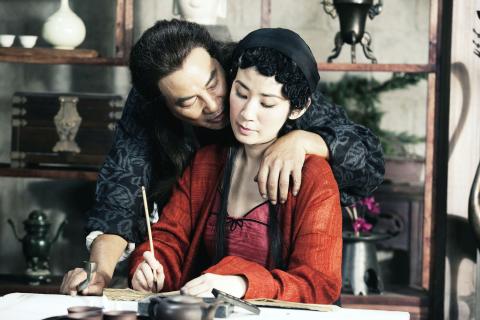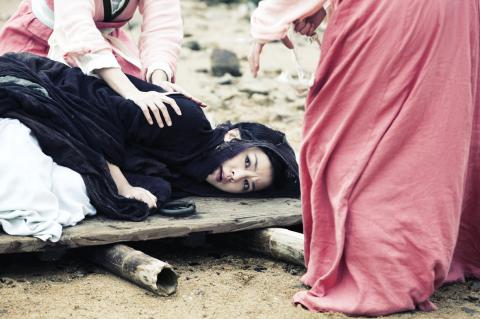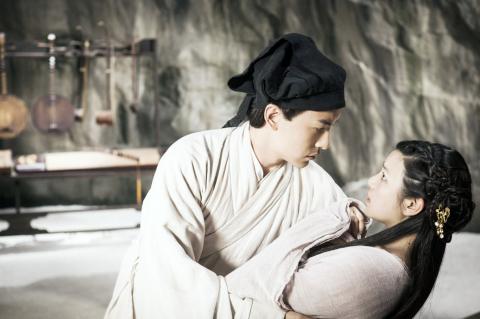In Ripples of Desire (花漾), lesbian filmmaker Zero Chou (周美玲) takes a break from her past acclaimed works on Taiwan’s homosexual community — Splendid Float (豔光四射歌舞團,2004), Spider Lilies (刺青,2007) and Drifting Flowers (漂浪青春,2008) — to tell a tale of heterosexual love and betrayal set on a fictional island during the Ming Dynasty. With a star-studded cast led by pop idols Jerry Yen (言承旭) and Michelle Chen (陳妍希), Chou’s first big-budgeted (NT$150 million) movie possesses both commercial appeal and cinematic ambition to create a period drama that is unequivocally Taiwanese.
Accompanied by the soulful nanguan (南管) music composed by iconic folk musician Chen Ming-chang (陳明章), the film opens with two young courtesans, Snow (Michelle Chen) and Frost (Ivy Chen, 陳意涵), performing in front of a large, excited crowd as residents come out to join the Ghost Month celebrations on the Floating Island. Though used as a penal colony by the Ming Empire, the southern isle nevertheless thrives on trade and has long become a haven for merchants, adventurers, pirates and other outcasts. Leading a gang of seafarers, charismatic Master Hai (Simon Yam, 任達華) places the place under his protection. Hai and his men earn respect by offering assistance to locals while defending the island against white colonists and the Ming imperial army.
At the center of the bustling activities is Floral Ripples, a brothel run by madam Hua Yue (Sandra Ng, 吳君如), who takes in the two sisters, Snow and Frost, and train them to become the island’s top courtesans. Virtuous and kind-hearted, Snow quickly falls in love with her voice teacher Wen (Joseph Cheng, 鄭元暢). Frost, on the other hand, believes that to survive in this cruel world, she needs to learn the art of manipulation and conceal her feelings for Scarface (Yen), Hai’s right-hand man.

Photo Courtesy of South Island Film Inc
Amid jealousy, strife and passion, the two sisters have all the while struggled to hide the secret that one of them suffers from a stigmatized disease, which will ruin their lives if made known to the islanders.
Inspired by director Chou’s childhood memories of growing up in Keelung, a port city where seamen from all over the world came and sought comfort at the neon-lit red-light district, the film ingeniously weaves together a fable of Taiwan caught in between the Western powers and imperial China through an intriguing love story between those who choose to stay on the untamed island. In her handling of the period piece, Chou replaces realism and history with atmospheric settings and pop aesthetics akin to that of anime and video games.
The pop sensibility is enhanced by the cast featuring big-name, young Taiwanese stars, though the emotional depth required by the characters is sacrificed to make way for the attraction of pretty-faced idols. The uneven narrative construction of the director’s previous works is still present, with melodramatic cliches sometimes interrupting the otherwise smooth narrative flow.

Photo Courtesy of South Island Film Inc
Billed as the first costume-drama movie made in Taiwan in 15 years, Ripples of Desire may have its share of flaws, but deserves attention and credit for its ambition to lift Taiwan’s filmmaking industry by working with local talent to create a genre piece that has not been done for more than a decade. It is also a successful example of how Taiwanese filmmakers can maintain strong local identity and their unique sensibilities when working for China-Taiwan collaborations aiming at the Chinese-speaking market.

Photo Courtesy of South Island Film Inc

Taiwan has next to no political engagement in Myanmar, either with the ruling military junta nor the dozens of armed groups who’ve in the last five years taken over around two-thirds of the nation’s territory in a sprawling, patchwork civil war. But early last month, the leader of one relatively minor Burmese revolutionary faction, General Nerdah Bomya, who is also an alleged war criminal, made a low key visit to Taipei, where he met with a member of President William Lai’s (賴清德) staff, a retired Taiwanese military official and several academics. “I feel like Taiwan is a good example of

March 2 to March 8 Gunfire rang out along the shore of the frontline island of Lieyu (烈嶼) on a foggy afternoon on March 7, 1987. By the time it was over, about 20 unarmed Vietnamese refugees — men, women, elderly and children — were dead. They were hastily buried, followed by decades of silence. Months later, opposition politicians and journalists tried to uncover what had happened, but conflicting accounts only deepened the confusion. One version suggested that government troops had mistakenly killed their own operatives attempting to return home from Vietnam. The military maintained that the

Jacques Poissant’s suffering stopped the day he asked his daughter if it would be “cowardly to ask to be helped to die.” The retired Canadian insurance adviser was 93, and “was wasting away” after a long battle with prostate cancer. “He no longer had any zest for life,” Josee Poissant said. Last year her mother made the same choice at 96 when she realized she would not be getting out of hospital. She died surrounded by her children and their partners listening to the music she loved. “She was at peace. She sang until she went to sleep.” Josee Poissant remembers it as a beautiful

Before the last section of the round-the-island railway was electrified, one old blue train still chugged back and forth between Pingtung County’s Fangliao (枋寮) and Taitung (台東) stations once a day. It was so slow, was so hot (it had no air conditioning) and covered such a short distance, that the low fare still failed to attract many riders. This relic of the past was finally retired when the South Link Line was fully electrified on Dec. 23, 2020. A wave of nostalgia surrounded the termination of the Ordinary Train service, as these train carriages had been in use for decades